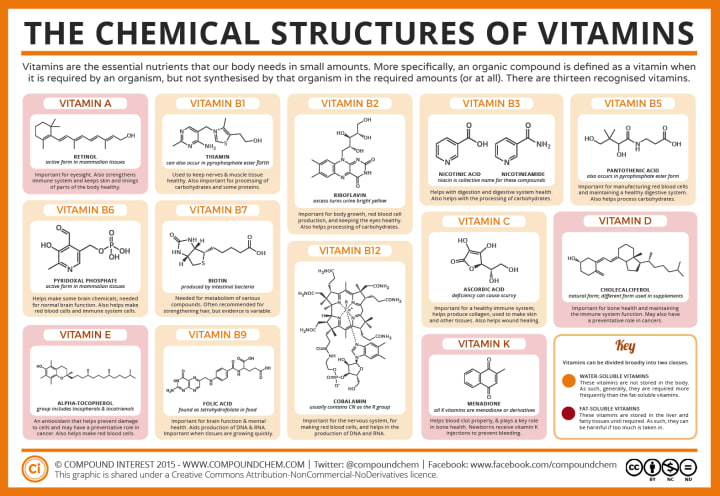Difference Between Natural and Synthetic Vitamins
The debate regarding the difference between natural and synthetic vitamins has health professionals offering up their advice.

Most health-conscious people out there make a point to look for food that delivers a powerful nutritional punch when they are trying to eat. Eating vitamin-rich foods means that our body has the goods it needs to keep functioning at maximum capability.
The right nutrition helps kids grow up to be healthy, adults feel better in their day to day routine, and even prevent sickness. After all, this is why our moms often would cajole us into eating out veggies - even if they tasted bad.
But, with the invention of synthetic vitamins, we can technically get the vitamins we need without having to eat nutrient-rich foods. Health gurus are quick to point out that pill-form vitamins aren't the same as taking them via food, and we should listen.
The chemical makeup of the vitamins are the same, but...

Vitamin C is still Vitamin C, even if it's in pill form or spray form. So, in that sense, both natural and synthetic vitamins are the same. The problem is that synthetic vitamins aren't metabolized as well as natural food borne vitamins - hence one of the biggest differences between natural and synthetic vitamins. Here's the reason why they're not metabolized the same.
While the vitamins you're buying in store may be identical to the ones in food, people need to be aware of the problem with synthetic vitamins. When you're buying synthetic vitamins, that's the only thing you're buying.
It seems okay, but the problem is that vitamins need to be packaged with other vitamins, enzymes, lipids, and proteins in order for the body to register that they need to be metabolized. If you are just taking isolated vitamins, like the ones found in pill form, you won't be able to process the vitamin as well as possible.
With the vitamins that fall into the synthetic category, your body will typically store them until they get the compound - or just excrete them. This can make trying to take vitamins as a whole useless in certain (but not all) cases.
Moreover, those pill-form vitamins also don't have the trace minerals that we need to function well. It is possible to get a dangerous mineral deficiency if you're not careful with what you eat.
Some synthetic vitamins can't even be used at all.

Fat-soluble vitamins like A, D, K, or E, require you to have some fatty food in order for them to be metabolized correctly. That being said, there are a lot of vitamins out there that don't have those fatty lipids to help you absorb these vitamins. The end result is a pill that probably will give you a tenth of the amount you're supposed to absorb.
"Natural" vitamin pills are the ones that come with the compounds necessary for the body to correctly absorb the goods.

In this sense, it is possible to take a natural vitamin pill and get the benefits of a good diet. This is because these natural pills come straight from food-grade ingredients and keep some of the minerals in them as well. However, these kinds of pills are very rare. Around 90% of all vitamins on the market are synthetic, which is difference between natural and synthetic vitamins.
That being said, it's still better to have synthetic vitamins than no vitamins at all.
Studies show that natural vitamins tend to be slightly better, but that there are some synthetic vitamins out there that are basically the same as natural in terms of absorption. So, don't feel shame over your vitamin habit. It's good for you, and can help prevent sickness.
That being said, you still need to eat those vegetables, kiddo.
About the Creator
Rowan Marley
Rowan Marley is a 20-year-old sports enthusiast who hails from Brooklyn. When he's not hitting up a local Zumba class, he's drinking organic smoothies. That's just how he rolls.
Enjoyed the story? Support the Creator.
Subscribe for free to receive all their stories in your feed. You could also pledge your support or give them a one-off tip, letting them know you appreciate their work.






Comments
There are no comments for this story
Be the first to respond and start the conversation.